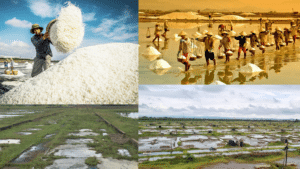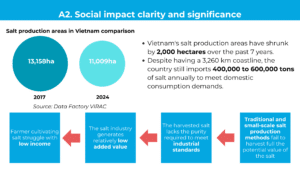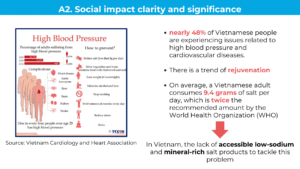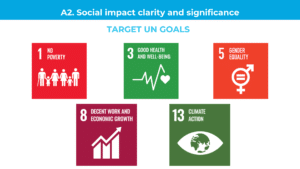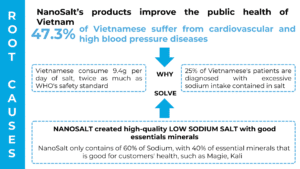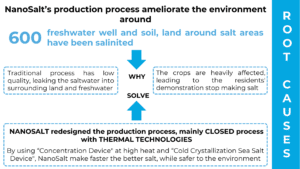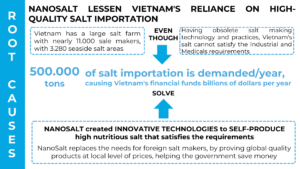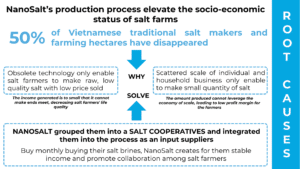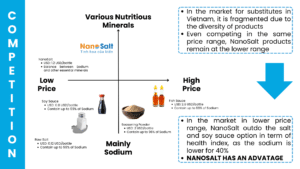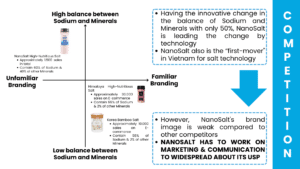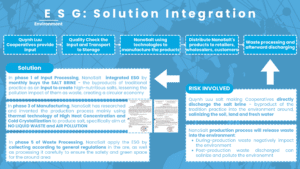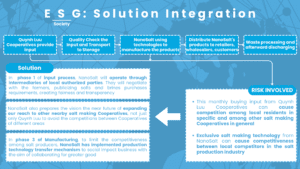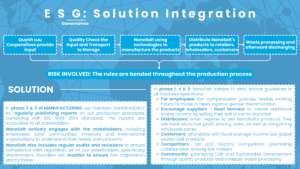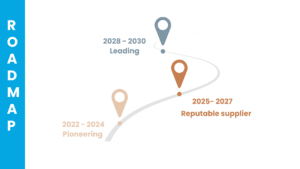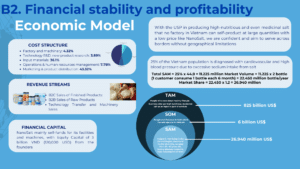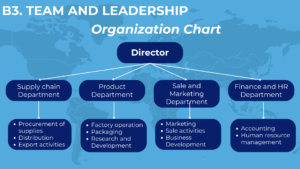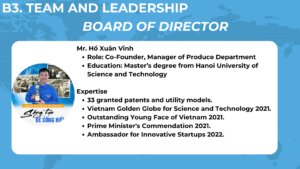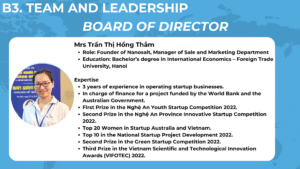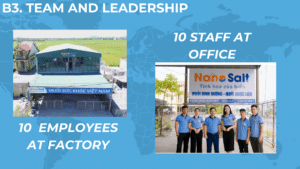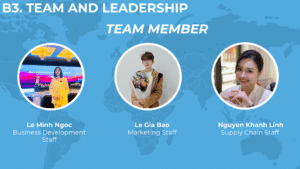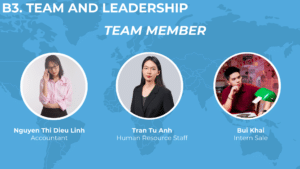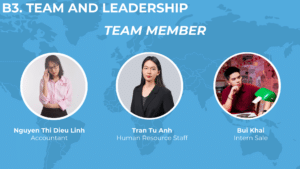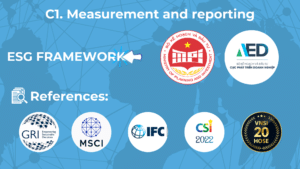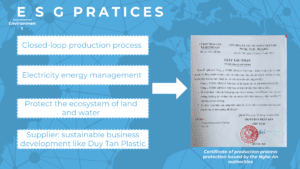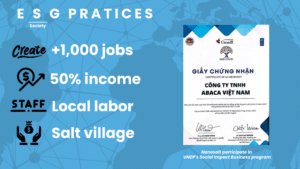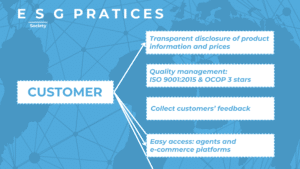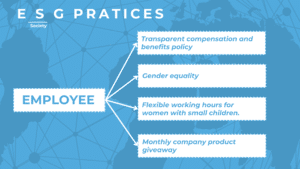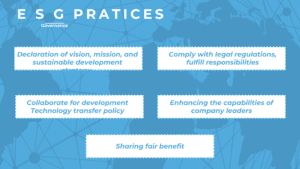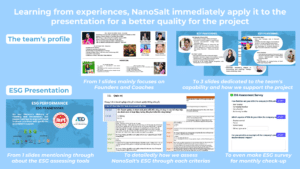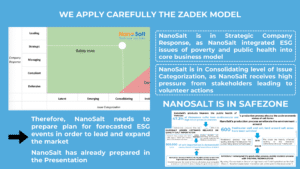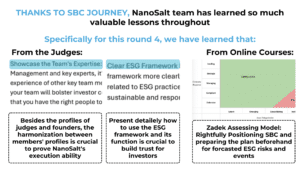SOCIAL IMPACT ACCELERATION
NANOSALT_VIDEO PITCHING_ROUND 4
A. Social business description
A1. Social mantra one-liner & A2. Social impact clarity and significance
Look at this pictures
Under the intense sunlight, farmers diligently and tirelessly produce salt. However, many salt fields across Vietnam have been abandoned due to low and unstable income.
These images have driven us, the sons of the salt villages, with a desire to contribute value to our homeland, to take action.
Upon further research, we realized that the main reason for this issue is that the farmers are using traditional, small-scale methods to produce salt, which do not fully harvest the salt’s nutritional value.
At the same time, we recognize the fact that approximately 48% of the Vietnamese population is experiencing issues related to high blood pressure and cardiovascular diseases, and these conditions are trending toward younger age groups. One of the main reasons cited by the Vietnam Ministry of Health is the excessive consumption of salt, leading to an intake of sodium that exceeds the body’s needs.
Therefore, driven by love and a desire to protect our family and future Vietnamese generations, Nanosalt’s team has developed a high-tech salt production process, using brine ( a by-product of the salt-making process), to produce less-sodium salt.
Nanosalt social mantra
“Providing nature – safety – healthy salt solutions, and creating sustainable livelihoods for salt farmers”
Our target UN goals are:
A3. Solution effectiveness and ESG integration
The root causes we realize:
Our positioning landscape:
ESG has been integrated in our solution
B. Social impact acceleration
B1. Mechanisms to accelerate impacts
Here is our roadmap
2022 – 2024 period: Pioneering in providing healthy salt, which is produced using advanced technology.
- Our result:
-
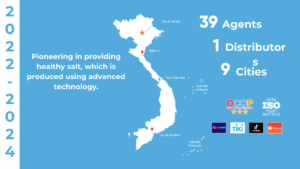
- Our individual customer and business customer:
-
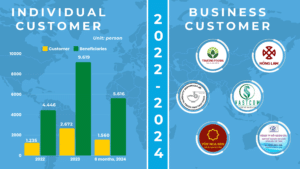
2025 – 2027 period: We want to become a reputable business providing salt to individual customers and corporate clients.
2028 – 2030 period: We want to Become a leading company in providing healthy salt in Vietnam and expanding the export market.
B2. Financial stability and profitability
B2.1. The economic model is solid
NanoSalt mainly self-funded its facilities and machines, with an Equity Capital of 3 billion VND (120,000 USD) from the founders. Our main financial needs refer to RnD, including new product research, development with the current product, and enhancement with the current production, all of which help us to sustain our business and expansion.
- Cost Structure
The cost structure is broken down into several key components:
- Factory and Machinery (4.32%)
- Technology R&D and New Product Research (3.89%)
- Input Materials (36.1%)
- Operations & Human Resources Management (7.78%)
- Marketing & Product Distribution (43.32%)
- Revenue Streams
The revenue streams highlight how the business generates income:
- B2C Sales of Finished Products
- B2B Sales of Raw Products
- Technology Transfer and Machinery Sales
Besides, NanoSalt has joined several competitions about startups, as well as incubators and conferences to both raise awareness of the brands and raise funds through prize money. NanoSalt has listed in the table below the amount accumulated:
- Championship at Creative Youth Festival (5,000,000 VND)
- Championship at Woman Innovation in Startup 2022 (10,000,000 VND)
- Top Excellent SIBs in ISSE-Covid Project (100,000,000 VND)
- [List other achievements with amounts and benefits]
And so many more with total funds raised up to 373,000,000 VND (approximately $14,920).
Nanosalt provides salt products to serve individual and business customers. We started launching products on the market in March 2022, after 5 years of thorough research.
Within nearly 2 years of launch, Nanosalt has seen strong growth in the number of customers and revenue, showing that Nanosalt products have been well received by the community..
In the end, we have the ROI as below:
| 2022 | 2023 | 2024 (expect) | 2025 (expect) | |
| ROI | 6,17% | 9,4% | 13,17% | 17% |
ROI that shows positive signs of increasing over time may indicate increased profitability over the years.
B3. Team and leadership
- Team members’ capacities:
After two years of developing our project, we’ve built a company structure with an organization chart that includes several key departments: the Director, the Supply Chain Department, the Product Department, the Sales and Marketing Department, and the Finance & HR Department.
We manage our company using a pyramid model. At the top, we have our founders, Mrs. Tham (in charge of Nanosalt’s business development) and Mr. Vinh (head of the Research and Development Department, and the creator of Nanosalt’s high-tech salt production process).
In our office, we have a dedicated team of 10 staff members managing these departments, while our factory employs 15 personnel who oversee the production line.
Our team in the SBC Competition includes various members:
The Nanosalt team brings a wide range of experience and expertise to the table, ensuring the smooth operation of Nanosalt. We also prioritize professional skills training and emphasize Nanosalt’s vision and mission, making sure all employees are aligned with our social impact business goals. We believe that every team member plays a crucial role in Nanosalt’s success and helps communicate our values to the broader community.
The NanoSalt team’s success is reflected in many ways, including a history of winning awards, achieving business milestones, and making a social impact across different projects. These accomplishments not only demonstrate our expertise and leadership but also lay a strong foundation for meeting the dual objectives of the NanoSalt project. Each team member contributes a proven track record that strengthens the project’s potential for sustainable success, whether through innovation, market achievements, or social initiatives.
Human Resource Strategy:
To achieve our development goals, our growth strategy is crucial:
- Skill Development: We focus on developing both professional and soft skills among our employees. Nanosalt actively participates in capacity-building programs for business leaders and managers, organized by UNDP (I See Covid) and Foreign Trade University (SIP 100 Programs). We also encourage other company members to join startup competitions to share Nanosalt’s mission with the community. For our factory team, we regularly organize training sessions on machine operation and labor safety.
- Employee Engagement: We strive to increase employee engagement with competitive local benefits, flexible working hours, and a profit-sharing policy (including monthly gift salt sets for staff). We also organize various team-building activities.
- Training Young Talent: We collaborate with universities to attract young talent (currently partnering with Phenikaa University and Foreign Trade University, with plans to explore opportunities with Vinh University in Nghe An).
- Career Development Opportunities: Offer clear pathways for career advancement within the company. This might include promotions, leadership training programs, or opportunities to lead new projects. By showing employees that their career growth is a priority, NanoSalt can retain top talent and keep the team aligned with the project’s long-term goals.
- Competitive Compensation: Ensure that compensation packages are competitive within the industry. This includes not just salary but also benefits like health insurance, flexible work arrangements, and performance bonuses that are linked to both financial outcomes and social impact achievements.
B4. Partnership and collaboration
| Stakeholder | Nanosalt’s Partner | Activities/ Commitments | Strategy to create/strengthen partnership and collaboration |
| Customer |
|
|
|
| Raw material supplier |
|
|
|
| Government |
|
|
|
| International Organizations |
|
|
|
| University |
|
|
|
| Media |
|
|
|
| Investor |
|
||
C. ESG reporting
C1. Measurement and Reporting
Nanosalt plans to implement an ESG report in 2025 using a toolkit developed by AED-MPI Vietnam, built upon globally recognized evaluation frameworks, built based on reference to internationally recognized ESG assessment frameworks:
(i) The 2016 Sustainable Development Assessment Toolkit by the Global Reporting Initiative (GRI),
(ii) MSCI ESG Ratings,
(iii) The 2012 Environmental and Social Performance Standards by the International Finance Corporation (IFC),
(iv) The 2022 Sustainable Business Index by the Vietnam Chamber of Commerce and Industry (VCCI) and the Vietnam Business Council for Sustainable Development (VBCSD),
(v) The ESG performance evaluation toolkit for listed companies (VNSI) by HOSE.
C2. Compliance with ESG standards and frameworks
Nanosalt is currently a small company in Vietnam, so it is suitable to use the Sustainable Business Practice Assessment Tool developed by the Department of Enterprise Development, Ministry of Planning and Investment of Vietnam (AED-MMPI), which 90% of companies in Vietnam follow.
In addition, the Vietnamese government has issued Decision No. 167/QD-TTg on the program to support private sector enterprises in sustainable business for the period 2022-2025. 167/QD-TTg on the program to support private sector enterprises in sustainable business for the period 2022-2025.
From there, Nanosalt has more opportunities to participate, and the government support program.
When mentioning the ESG reporting requirements in the places where Nanosalt works domestically and abroad, Nanasalt carefully studies the requirements in turn in the factors E, S, G
First of all, in Vietnam, we are currently following Keslio- Sustainability Advisory, and the first factor considered is environmental disclosures.about our social impact statement requirement report. Therefore, we have applied the multi-layer separation technology process to create two main impacts for society
- Contribute to the sustainability of natural resources
- Mitigate the negative environmental effects of salt production, such as water pollution and land degradation
The second element is social performance reports, where the requirements are for the company to report information about employee performance and metrics. As observed, ABACA company employees work productively thanks to good working conditions as well as the company’s concern for employee health through giving good health gifts to the company itself.
The last element is governance reports, with this element, governance reporting involves disclosing the internal practices and policies that govern a company’s operations.
- Diverse knowledge and experience
- Legal and Governance Expertise: Ensures compliance with regulations and effective governance frameworks
- Financial Management: Expertise in managing finances, investments, and ensuring financial transparency
- Industry Insight: A deep understanding of the salt production and health sectors informed decision-making and strategic planning drives.
- Technological Advancement: Leveraging technological innovations to enhance operational efficiency and product quality.
- Co-founder Contribution: Mr. Ho Xuan Vinh & Mrs. Tran Thi Hong Tham’s extensive experience and innovative contributions to product development underscore
- Gender Diversity: NanoSalt’s governance structure promotes gender diversity, and ensures balanced representation in decision-making processes. This inclusion is pivotal as it empowers women in local salt craft villages, contributes significantly to economic development, and reduces inequalities within the community.
- Monitoring and evaluating corporate governance: Over the past year, NanoSalt’s BOD has implemented robust processes to monitor and evaluate corporate governance through Key Performance Indicators (KPIs), Regular Assessments, and Comprehensive Reporting.
Moreover, in Vietnam, it is on January 5, 2022, the Prime Minister signed Decision No. 02/QD-TTTg approving the National Strategy on Nutrition for the period 2021 – 2030 and the Vision to 2045 aiming to improve product nutrition. Specifically, the average salt consumption of the population (15–49 years old) will decrease to below 8 grams per day by 2025 and below 7 grams per day by 2030.
This shows that government policies are increasingly expanding for the salt industry. Seizing that opportunity, Nanosalt has equipped some of them as an affirmation of the company’s reputation as well as that of nutritional products
One of them is the 3-star OCCOP certificate certifying it as a typical rural industrial product. In addition, going further, Nanosalt is aiming for the Fair for Life certificate, allowing your products coming from Fair Trade to be commercialized worldwide.
Not only promoting ESG in line with domestic, Nanosalt also continues to cooperate with foreign partners, including Korea in the past year, in which there were exchanges on products that are in line with ESG requirements in your country. From there, Nanosalt sets a further target to the US and EU


